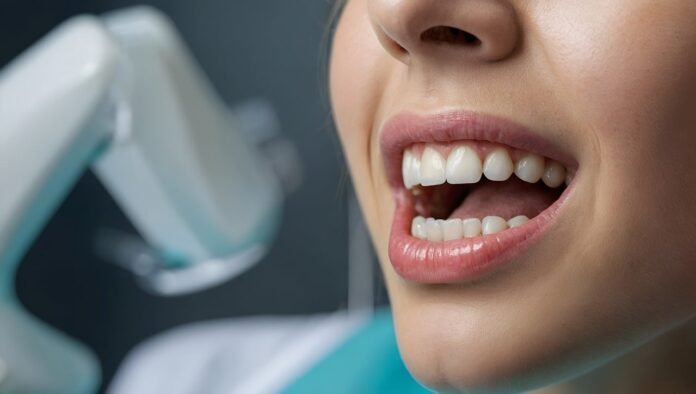Key Takeaways:
- Regular dental check-ups and good oral hygiene at home are essential for maintaining dental health.
- Poor oral health can contribute to systemic conditions such as diabetes, heart disease, and respiratory infections.
- Tooth decay can be prevented with regular brushing, flossing, and limiting sugary foods.
- Gum disease can be prevented with good oral hygiene practices and professional cleanings.
- Techniques such as conscious sedation can help patients with dental anxiety feel calm and comfortable.
- Pediatric dental care focuses on building healthy habits and protecting developing teeth.
- Pregnant women should maintain regular dental visits and practice proper oral hygiene.
- Senior dental care focuses on preventing tooth decay, gum disease, and tooth loss.
- Knocked-out teeth should be rinsed and placed back in the socket or stored in milk/saliva for immediate dental care.
- Toothaches and dental trauma should be evaluated by a dentist for proper treatment.
1. The Basics of Dental Health
Oral health plays a crucial role in our overall well-being. It not only affects our ability to speak and eat but also impacts our self-confidence and quality of life. To maintain optimal dental health, regular check-ups are essential. If you’re looking for a trusted dentist Orlando, scheduling regular visits with a local professional can ensure your excellent dental health. Dentists recommend visiting the dentist every six months for a comprehensive examination and professional cleaning.
For those considering long-term solutions to tooth loss, visiting a specialized provider like Stubbs Dental Implant Center can offer permanent, natural-looking replacements that restore both function and confidence. Dental implants not only help maintain jawbone integrity and prevent shifting of adjacent teeth but also provide a durable solution that closely mimics natural teeth. With advancements in implant technology and personalized care, achieving a secure, healthy smile is more accessible than ever.
During a dental check-up, your dentist will thoroughly examine your teeth, gums, and mouth for any signs of decay, gum disease, or other dental issues. They will also perform a dental cleaning to remove plaque and tartar buildup, reducing the risk of cavities and gum disease.
In addition to regular dental check-ups, practicing good oral hygiene at home is vital for maintaining dental health. Brushing your teeth at least twice a day with a fluoride toothpaste, flossing daily, and using mouthwash can help remove plaque and food particles, prevent cavities, and keep your breath fresh.
For those seeking to enhance their daily oral care routine, exploring the various Manuka honey uses can offer a natural supplement to traditional hygiene practices. Renowned for its potent antibacterial and anti-inflammatory properties, Manuka honey can be used as a soothing mouth rinse to help reduce harmful oral bacteria and promote gum health. While not a replacement for brushing and flossing, this natural remedy can be a valuable addition to a comprehensive approach to maintaining a healthy mouth.
It’s important to understand the connection between oral health and overall well-being. Research suggests that poor oral health can contribute to various systemic conditions such as diabetes, heart disease, and respiratory infections. Maintaining good oral hygiene and seeking prompt dental care can help reduce the risk of these health issues.
2. Common Dental Issues and Solutions
Dental issues are quite common, but fortunately, most can be prevented or treated with proper care. One of the most prevalent dental problems is tooth decay, also known as dental cavities. Tooth decay occurs when bacteria in the mouth produce acids that erode the tooth enamel. Regular brushing, flossing, and dental check-ups can help prevent tooth decay. Additionally, limiting sugary foods and beverages and using fluoride products can further protect against cavities.
Gum disease is another common dental issue that affects the gums and supporting structures of the teeth. It is caused by plaque buildup along the gumline, leading to inflammation and infection. To prevent gum disease, it’s crucial to maintain good oral hygiene practices, such as regular brushing and flossing, and visit the dentist for professional cleanings. In more severe cases, treatment may involve deep cleaning procedures and antibiotic therapy.
For those who experience dental anxiety, a visit to the dentist can be a daunting experience. However, there are techniques to help you relax and overcome dental anxiety. Dentists can provide various options such as conscious sedation or nitrous oxide to help patients feel calm and comfortable during dental procedures. Communication with your dentist about your fears and concerns is essential to find the most suitable solution for you.
3. Dental Care for Different Life Stages
Dental care needs vary depending on different life stages. Pediatric dental care focuses on building healthy habits for children. It’s important to start dental care early by gently cleaning your baby’s gums with a soft cloth and scheduling their first dental visit by their first birthday. Regular dental check-ups, fluoride treatments, and sealants can help protect your child’s developing teeth and promote good oral hygiene habits.
Pregnancy brings about hormonal changes that can affect the oral health of expectant mothers. It’s crucial to maintain regular dental visits during pregnancy for check-ups and cleanings. Pregnancy gingivitis and gum disease are common during this time, so proper oral hygiene and professional dental care are vital. It’s also important to discuss any concerns with your dentist and avoid dental procedures during the first trimester if possible.
As we age, maintaining good oral health becomes increasingly important. Senior dental care focuses on preventing tooth decay, gum disease, and tooth loss. Regular dental check-ups, proper oral hygiene practices, and a balanced diet can help keep teeth and gums healthy. For seniors with missing teeth, dental implants, dentures, or other tooth replacement options can restore their smile and improve their quality of life.
For seniors on a fixed income, accessing these important treatments can be a financial concern. Exploring available assistance programs is a key step. In Canada, understanding the specific CDCP benefits for dentures and other covered services can significantly reduce out-of-pocket costs for necessary dental work, making it easier to maintain a healthy, functional smile in your later years.
4. Dental Emergencies: How to Handle Unexpected Dental Issues
There are instances when dental emergencies occur, requiring immediate attention. One common dental emergency is a knocked-out tooth. If this happens, it’s crucial to act quickly. Rinse the tooth gently with water, without scrubbing or removing any attached tissue. Try to place the tooth back into its socket if possible, or keep it in a container of milk or saliva and seek immediate dental care.
Toothaches can also cause immense discomfort. Home remedies such as rinsing with warm saltwater, applying a cold compress, or taking over-the-counter pain relievers may provide temporary relief. However, it’s important to seek professional help if the pain persists or if there are other symptoms such as swelling or fever.
Dental trauma, such as a broken or chipped tooth, can occur due to accidents or injuries. If you experience dental trauma, it’s essential to contact your dentist as soon as possible. Depending on the severity of the damage, treatment options may include dental bonding, dental crowns, or dental implants.
Having a secure dental plan is invaluable when it comes to handling dental emergencies and providing peace of mind and financial protection during unexpected dental issues. These plans typically offer coverage for urgent dental care, such as severe toothaches, broken teeth, or sudden infections, ensuring that you can access prompt treatment without worrying about the cost. With a secure dental plan, you have access to a network of dental professionals who can provide immediate assistance, reducing the risk of complications and promoting faster recovery. By alleviating the financial burden and providing quick access to care, a secure dental plan helps you effectively manage dental emergencies, safeguarding your oral health and overall well-being.
In conclusion, securing your smile requires a comprehensive approach to dental health and safety. By understanding the basics of dental health, addressing common dental issues, tailoring dental care to different life stages, and knowing how to handle dental emergencies, you can maintain optimal oral health and protect your smile for years to come.
FAQ
Question: How often should I visit the dentist?
Regular dental check-ups are recommended every six months for a comprehensive examination and professional cleaning.
Establishing a consistent dental home is one of the most important steps you can take for long-term oral health. For residents in Southern California, the San Diego Dental Center offers a comprehensive range of services—from routine preventive care to advanced restorative treatments—all within a single, trusted practice. Building a relationship with a dedicated dental team ensures continuity of care, personalized treatment plans, and a proactive approach to maintaining your healthy, secure smile for years to come.
Question: How can I maintain good oral hygiene at home?
Brush your teeth at least twice a day with fluoride toothpaste, floss daily, and use mouthwash to remove plaque and food particles and prevent cavities.
Question: What are some common dental issues and their solutions?
Tooth decay can be prevented with regular brushing, flossing, and limiting sugary foods. Gum disease can be prevented with good oral hygiene practices and professional cleanings. For dental anxiety, techniques such as conscious sedation can help patients feel calm and comfortable during procedures.
Question: How should dental care differ for different life stages?
Pediatric dental care focuses on building healthy habits and protecting developing teeth through regular check-ups, fluoride treatments, and sealants. Pregnant women should maintain regular dental visits and practice proper oral hygiene. Senior dental care focuses on preventing tooth decay, gum disease, and tooth loss through regular check-ups, proper oral hygiene practices, and tooth replacement options.
Question: What should I do if a tooth gets knocked out?
If a tooth gets knocked out, rinse it gently with water and try to place it back into its socket. If this is not possible, keep it in a container of milk or saliva and seek immediate dental care.
Question: How can I handle a toothache or dental trauma?
For temporary relief of a toothache, you can rinse with warm saltwater, apply a cold compress, or take over-the-counter pain relievers. However, it’s important to seek professional help if the pain persists or if there are other symptoms such as swelling or fever. Dental trauma should be evaluated by a dentist for proper treatment.
Question: How does oral health affect overall well-being?
Poor oral health can contribute to systemic conditions such as diabetes, heart disease, and respiratory infections. Maintaining good oral hygiene and seeking prompt dental care can help reduce the risk of these health issues.
Question: What are the benefits of fluoride products?
Fluoride products, such as toothpaste, can help protect against cavities by strengthening the tooth enamel and reducing the risk of tooth decay.


























